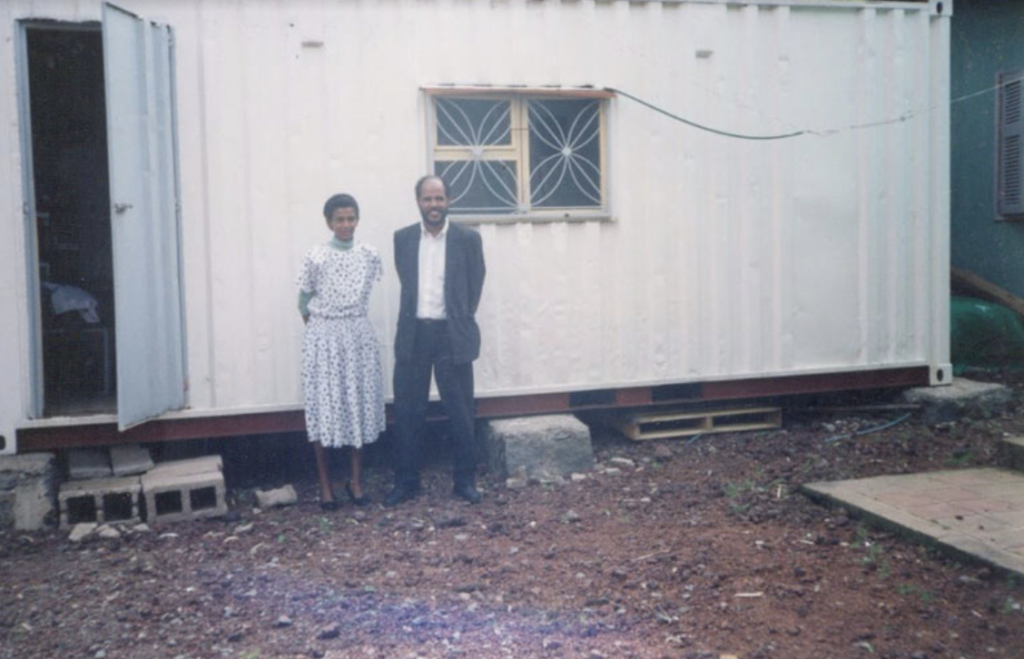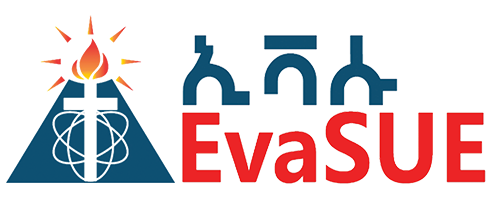Brief History of EvaSUE
Thus far the Lord has helped us!

Our First Office
1950s
The 50,000-strong, 176-campus Evangelical and Students and Graduate Union had its humble beginnings in a small student Bible study group at Addis Ababa University, the then Haile Selassie I University (HSIU). Prior to 1957 E.C (1965), five students had committed themselves to fasting, prayer and Bible study. Seeking a place to gather, these students rented a small house near the university with 35 Ethiopian birr. Names like Ato Teka Gebru, Brehane Abraham, Ekubezge Seyoum and Philipos Kameri were among those who had a significant part in the students gathering at the small rented house. The prayer meeting of these students was lively and filled with an undying passion for them to share their faith with unbelievers. It was also marked by a contagious love for one another. This small beginning through prayer, fellowship and teaching, attracted many students who joined the group for prayer, Bible study and worship. At that time, there was also a regular university student centered program at SIM (Sudan Interior Mission) Youth Center which was located around Arat (4) Kilo. University students attended programs that were held both in the small rented prayer house and SIM Youth Center. The latter was a key place of equipment and edification. Expatriate staff, which had come to HSIU as teachers, were a great encouragement to the university students. A few of these expatriates were Dr. Robinson, Dr. Perry, Dr. Rose, Dr. Dennis, and a little later, Dr. Atwood. These professors had a heart for student ministry and encouraged students in their faith, supporting them in any manner they could.
The expat teachers had significant involvement in teaching God’s Word at the Center. Through their relationship with the International Fellowship of Evangelical Students (IFES), they were able to bring gifted preachers and teachers from different parts of the world to the Youth Center.
With the growing interest among university students, the director of the SIM Youth Center, Mr. Manski, prepared a special place for them to come together for prayer and Bible study. Though their meeting had no a regular format, these students continued to meet repeatedly. As time went on and the fellowship strengthened, the desire for a name came to the discussion table. In 1966, without taking much time, they thoughtfully choose the name, Ethiopian University Christian Students’ Fellowship (EUSCF). During this same period, student fellowships were also established at HSIU’s Gondar and Haromaya campuses, which were the then part of HSIU.
In 1967, the first conference of Ethiopian University Students’ Christian Fellowship (EUSCF) was held in Ambo town. The attendees were from Addis Ababa Campuses, Haromaya and Gondar Colleges. There was a representative of the Pan Africa Evangelical Students Fellowship (PAESF) from Kenya. At this point of history, EUSCF had three local fellowships on three campuses run by local committees and coordinated by the National Committee. In 1968, the venue for the regular meetings of EUSCF moved to the then newly-constructed Mekane Yesus Youth Hostel, located at Amist (5) Kilo. From there, the student fellowship flourished.
1970’s
In 1970, as the number of Christian graduates increased, the Graduates’ Christian Fellowship (GCF) was established, with Ato Solomon Lulu as the first chairman. Fond of their experiences with EUSCF, these graduates attached to the student fellowship and committed to supporting student ministry.
Sunday afternoon youth meetings for students were launched sometime between 1973 and 1974. They became the groundwork for the establishment of the Ethiopian High School Students Christian Fellowship (EHSCF).
March of 1974 was the turning point for EUSCF when Ms. Mildred Young came to train students in Bible study techniques. Her coming was timely as the university was closed, and students had ample time to engage in Bible study training. In 1975, the joint retreat of the EUSCF National Committee and the Addis Local Committee was convened at Sodere and Ms. Young accepted the invitation of the committee for her to be a staff worker for EUSCF. In the summer of 1975, the EHSCF was formally established. In one-year period EHSCF grew to a National Fellowship which included seven regions, and eventually all the regions of the country.
In September 1975, Ato Tekeste Teklu was invited to join the student work as the first Ethiopian staff worker to coordinate the expanding Christian student work. In 1976, with much effort of Tekeste, the Nurse Students’ Christian Fellowship (NSCF) was established bringing the number of student-related fellowships to four, each with its own purpose and activities.
During the period of 1974 to 1976, the succession of events in the Christian student movements was fast and the growth was unprecedented, demanding for a new and innovative way of coordination. This required a stronger body that would coordinate the work of EUSCF, GCF, EHSCF and NSCF. Consequently, an ad hoc committee was formed to discuss on ways and means of bringing these fellowships under one umbrella and to draft a constitution for this organization. This committee, spear-headed by GCF and with student participation, drafted the constitution, and in a joint meeting of representatives from EUSCF, GCF, EHSCF and NSCF, the Evangelical Students’ Union of Ethiopia (EvaSUE) was established. The Constitution of EvaSUE had three parts: structural policy, staff policy and financial policy. The General Council was constituted of representatives from EUSCF, GCF, EHSCF and NSCF, Board and staff workers. The formation of EvaSUE was a milestone in student ministry and facilitated the strengthening and coordination of the same.
1980’s to 1990’s
The period of 1976 to 1982 was a period of unparalleled growth for EvaSUE. As a result, more full-time staff workers were brought into the ministry. By the end of 1981, the situation in the country was becoming dire, and the functioning of EvaSUE became increasingly difficult, as persecution had intensified. In 1980, the socialist regime, or the Derg, closed Mekaneyesus Hostel where students were meeting every week for fellowship and Bible study. As the cruelty of the dictatorial regime increased, open spiritual gatherings became very difficult. At that time, EvaSUE board members discussed the issue and decided to simply go underground without declaring the suspension of the activities of EvaSUE. In taking this decision, the board asked the collaboration of the Scripture Union to provide a refuge for the student work by giving workspace for the staff and providing ID cards. It was decided to hand the work of EHSCF over to the Scripture Union, while the work of EUSCF was handed over to the staff of EvaSUE. This situation continued until 1988.
In 1988 the National Committee of EUSCF, inundated by the ever-expanding work, demanded that something be done to support the student work. Then, the National Committee challenged the GCF to rescue the student work. The National Committee of GCF then took the job of reconstituting EvaSUE, and a committee of 11 people was formed to study ways and means of reorganizing the student work. After lengthy deliberations it was decided to reform the board and invite a staff worker. Hence, in 1991, EvaSUE resurfaced from hibernation to continue the work with full-time staff. This can be understood as the beginning of the second phase of the Christian student movement.
Some of the major developments of this time were the rekindling of financial and organizational support from denominations, Christian organizations and individual graduates; the establishment of Hebron, the ministry’s quarterly magazine; the re-establishment of formal trainings, visits and counselling for students; the acquisition of office space first from Hope Enterprise and then the International Bible Society for free, and later a minimal fee; and the increase in the number of staff workers. In 1995 EvaSUE became an affiliate member of the International Fellowship of Evangelical Students (IFES), at the IFES general assembly meeting held in Nairobi.
2000 – the Present
Some of the major developments from 1997 to 2002 were the acquisition of a plot of land with the support of IFES to house the office of EvaSUE, the opening of the first regional office in Hawassa in August 1999, the opening of the second regional office in Jimma in April 2001, the beginning of yearly regional training programs for student leaders and the establishment of different projects in partnership with various Christian organizations.
From September 2002 to June 2006, the third and fourth regional offices opened in Bahir Dar and Harar, respectively. Other major developments during this period were the re-establishment of the Associates’ ministry (formerly known as Graduates’ Christian Fellowship) in a monthly prayer meeting; the revision of the EvaSUE constitution and the change of name to Evangelical Students’ and Graduates’ Union of Ethiopia to include graduates, while retaining the acronym EvaSUE; and the revision of the office administration bylaws. Other major events during this period were the purchase of the first office building of the ministry, the establishment of the Alumni Ministry in North America and Europe, and the invitation of the first full-time staff to coordinate the graduate wing of the ministry.
From June 2006 to the present, EvaSUE has witnessed a growing number of affiliated Campus Christian Student fellowships and staff workers. At present there are fifty two government and private universities and several colleges. And within these institutions there are one hundred seventy six (176) Campus Evangelical Christian Student fellowships who are affiliated with EvaSUE’s ministry. Basing on its stunning growth, the International Fellowship of Evangelical Students (IFES) has named EvaSUE one of the fastest growing student movements.
EvaSUE’s growth is not only in the number of affiliated Campus Christian Fellowships, but also in staff workers and regional offices. At present EvaSUE has nine (9) regional offices: North, North-East, North-West, Sout1, South-2, South-West, East, West, and Central Region. There are a total of one hundred five (105) staff who are working in these regions.
May all the glory be to God who does great things throughout history!
We, from the bottom of our heart, believe that the work of writing EvaSUE’s history will never stop, as God, the History Maker, and His devoted children will never stop doing great things to the glory of Jesus and the benefit of campus evangelical Christian students!
